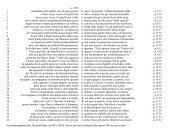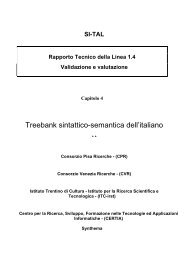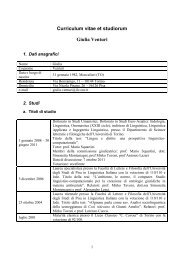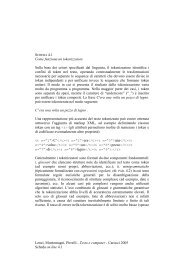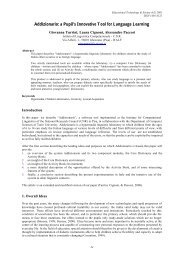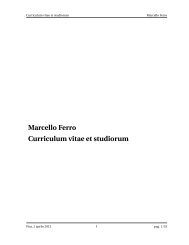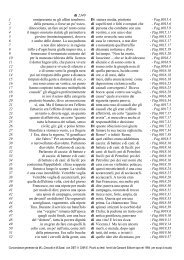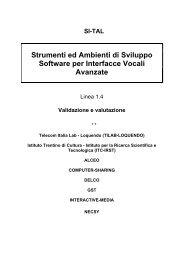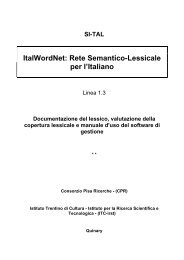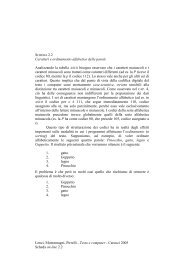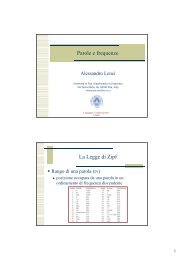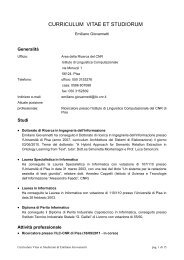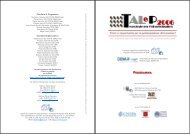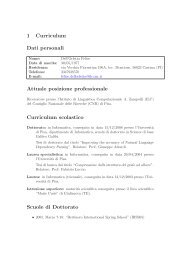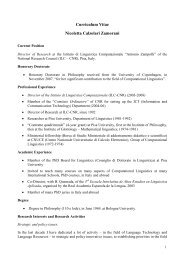Curriculum Vitae - Istituto di Linguistica Computazionale - Cnr
Curriculum Vitae - Istituto di Linguistica Computazionale - Cnr
Curriculum Vitae - Istituto di Linguistica Computazionale - Cnr
Create successful ePaper yourself
Turn your PDF publications into a flip-book with our unique Google optimized e-Paper software.
especially for fun<strong>di</strong>ng agencies, national organisations and industry, and to initiatives for improving<br />
international cooperation and coor<strong>di</strong>nation in the field.<br />
It is my position that we have not just to follow the main scientific trends, but to influence – through<br />
our research, our competence and the strength of our visions – new developments in the field and<br />
thus establish new trends and set new research para<strong>di</strong>gms. This is a winning strategy on the<br />
“research market” that I have always tried to apply. This was/is obviously decisive also in the ability<br />
of getting so many international projects and establishing international cooperation.<br />
Main areas of research:<br />
Computational Linguistics; Language Technology; Language Resources and Knowledge Resources;<br />
Computational Lexicography and Lexicology: Lexical Knowledge Bases, Multilingual lexicons,<br />
Machine-readable <strong>di</strong>ctionaries, relations between Lexicons, Ontologies and Terminologies;<br />
Standar<strong>di</strong>sation and reusability of lexical resources; Corpus Linguistics and statistical analysis of<br />
textual corpora; Knowledge Acquisition from multiple (lexical and textual) sources, integration and<br />
representation; Morphology and word-formation; Lexical Semantics and Semantic Annotation;<br />
Collocations and Multi-words; Natural Language Processing and Language Engineering<br />
Applications: of various types (filtering, summarisation, information extraction, etc.) and in<br />
<strong>di</strong>fferent areas (e-government, humanities and social sciences, me<strong>di</strong>cine, biology, etc.); Validation<br />
of Language Resources; Infrastructural issues related to Language Resources.<br />
Major achievements:<br />
At the beginning of the „80s I started a new area of research – acquisition of lexical information<br />
from machine-readable <strong>di</strong>ctionaries – that soon became a trendy subject of research, starting the<br />
now consolidated “data-driven” approach. This gave us the coor<strong>di</strong>nation of the first ESPRIT Basic<br />
Research Action, ACQUILEX (Acquisition of Lexical Knowledge for Natural Language Processing<br />
Systems) (1989-1995). I was then the coor<strong>di</strong>nator of the first European project on automatic<br />
acquisition of linguistic information from textual data, SPARKLE (Shallow Parsing and Knowledge<br />
extraction for Language Engineering) (1995-97), designing an innovative model of dynamic<br />
computational lexicons.<br />
Together with Antonio Zampolli, we initiated, in the „80s, the quite new sector of “Language<br />
Resources” that has now become an established and very influential sector in our field. This has led<br />
to an impressive number of European and international projects where ILC was/is involved,<br />
bringing a large amount of fun<strong>di</strong>ng that allowed/allows hiring many young researchers. We<br />
introduced the notion of the “infrastructural” role of language resources that became soon widely<br />
recognised and was at the basis of many strategic activities, from the „90s, both in Europe and<br />
worldwide. This led also to the establishment in 1998 of the biennial international LREC<br />
Conference, of which I am the General Chair since the one in 2004.<br />
I introduced the notion of “reusability” in the area of Language Resources, that finally led to a series<br />
of important initiatives in Europe and world-wide aimed at standar<strong>di</strong>sation in the field, mostly<br />
coor<strong>di</strong>nated by us at ILC.<br />
I was one of the designers of the ESFRI CLARIN (Common Language Resources and Technologies<br />
Infrastructure) for Social Sciences and Humanities – of which I am the Chair of the Scientific Board<br />
– now becoming an ERIC (one of the very few in the Humanities).<br />
I am currently the coor<strong>di</strong>nator of the FLaReNet (Fostering Language Resources) Network, with the<br />
explicit mandate of issuing recommendations for future activities in the field – mainly for the<br />
2



